By Zara Houshmand
Ubuntu, or botho in the language of Botswana, roots the definition of our humanity in how we relate to others. It is an African philosophy of life, a foundation for ethics, and a way of understanding the human spirit that holds power to heal trauma. It resonates deeply with Buddhist ideas about interrelationship. Recent neurobiological research reveals processes underlying communication, empathy, and caring, as well as group identity, fear, and conflict that throw light on ubuntu and its healing potential.
This convergence of ideas lies at the heart of the Mind & Life Botswana Dialogue, which brought African humanitarian and spiritual leaders, scholars and healers together in conversation with cognitive scientists in Gaborone, Botswana in August of 2017. The 32nd Dialogue hosted by Mind & Life over three decades, it was the first to expand these historical conversations to include African perspectives and voices. It was also the first to focus on indigenous wisdom, and to emphasize social justice and women’s rights—a timely turning point for the organization and a natural extension of its mission of fostering a more compassionate world.
Beyond these unique elements, this was the first Mind & Life dialogue to take place in the absence of the Dalai Lama, who cancelled his trip to Botswana at the last minute for health reasons. In a video message, he offered his regrets and expressed his appreciation for the eager interest shown by Botswana’s President Serêtsê Khama Ian Khama, who would address the conference later that day. He also spoke of his initial excitement at the prospect of coming to Africa, and his intention to visit Botswana in future.
The Dalai Lama linked the theme of ubuntu to the “oneness of seven billion human beings”—the shared and interrelated experience of humanity, which he views as the only remedy for the many real problems we face due to “secondary differences” of nationality, religion, and race. Throughout his lifetime, he has observed the growing maturation of humanity and the desire for peace. Resorting to force as a way of solving problems is outdated thinking, he said. Human problems must be solved with dialogue. The 21st century should be the century of dialogue, “the peaceful century.”
The Mind & Life Institute is based in Charlottesville, Virginia where a violent rally of white supremacists had left one dead and more than thirty injured just days before the meeting in Botswana. The question of how human beings could learn to live together with mutual respect, compassion, and cooperation took on a special urgency in that moment. The possibility of an answer rooted in African culture seemed especially poignant and charged with hope, given the legacy of historical trauma that burdens African Americans, and that continues to surface in events like those in Charlottesville.

Reverend Canon Mpho Tutu van Furth
In the opening session, the Reverend Canon Mpho Tutu van Furth, Archbishop Desmond Tutu’s daughter, spoke on behalf of her parents who sat beaming in the front row. She spoke of ubuntu in very practical terms as a key to Africa’s sustainable development. When the design process of a development project invites the active participation of those who will be most affected and honors their views, the familiar boondoggles of projects driven by politics, ego, and greed can be prevented.
Rev. Tutu van Furth shared her father’s definition of ubuntu and expanded on it eloquently: “Ubuntu is the essence of being human. It speaks of the fact that my humanity is caught up and inextricably bound up in yours. I am human because I belong. Ubuntu speaks about wholeness, it speaks about compassion. A person with ubuntu is welcoming, hospitable, warm, and generous, willing to share. Such people are open and available to others. They are willing to be vulnerable, they are affirming of others. They do not feel threatened that others are able and good, for they have a proper self-assurance that comes from knowing that they belong in a greater whole. They know that they are diminished when others are humiliated, diminished when others are oppressed, diminished when others are treated as if they were less than who they are. The quality of ubuntu gives people resilience, enabling them to survive and emerge, still human despite all efforts to dehumanize them.”
